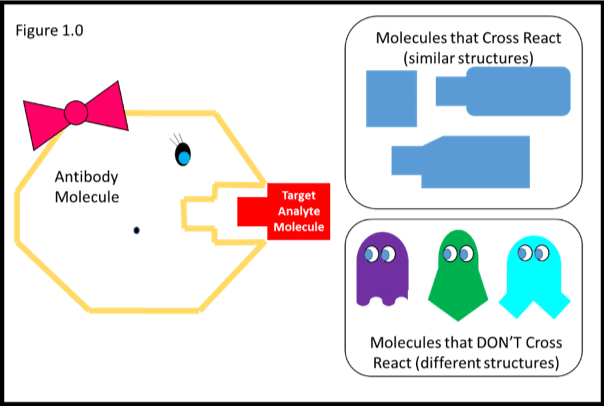People working to overcome a substance use disorder (SUD) face many challenges along the path to recovery such as physical ailments, withdrawal symptoms, cravings, and relationship mending. Clinically appropriate SUD treatment dictates the use of systematic monitoring via drug testing. SUD treatment absent a sound drug testing process is like treating hypertension absent a blood pressure cuff. Unfortunately, drug testing is not as simple as measuring blood pressure.
Fortunately, cross-reactivity ‘noise’ is one hurdle that treatment professionals can eliminate via the use of American Society for Addiction Medicine recognized evidenced-based practices. These practices, include:
- Patient education on what is acceptable to take and what to avoid;
- Use of a patient agreement;
- Tailoring the drug screen to the individual patient;
- Consultation with a SUD specialized toxicologist; and
- Chromatography testing.
What is cross-reactivity? Cross-reactivity is simply when a drug screen identifies an approved substance as a banned substance. For example, a patient attempting to overcome methamphetamine use that takes a pseudoephedrine based cold remedy may, depending on dose, test positive for amphetamines. Drug screen technology compares a known to an unknown via the binding of a target analyte or drug molecule to a known antibody. Cross-reactivity occurs when an analyte or drug molecule very similar to the target analyte or drug molecule binds to that antibody. The unknown analyte may not be an exact match, however if it is close enough, the outcome of the test will be positive. Think of Mrs. Pac-Man as the antibody. She munches the pellets (i.e., a positive result) but cannot munch Blinky, Pinky, Inky, and Clyde (Refer to figure 1.0). The pellets are the target analytes or similar structures that cross-react with the target analytes. Mrs. Pac-Man cannot eat Blinky, Pinky, Inky, and Clyde, and therefore there is no cross-reactivity issue for these substances.
 When a positive test occurs, the clinician should discuss the positive result with the patient, adjust the treatment plan, and or order additional chromatography testing. However, absent the use of the above practices, which are described below, wrongly confronting the patient naturally puts the patient in a defensive position that could lead to a sense of ‘learned helplessness’.
When a positive test occurs, the clinician should discuss the positive result with the patient, adjust the treatment plan, and or order additional chromatography testing. However, absent the use of the above practices, which are described below, wrongly confronting the patient naturally puts the patient in a defensive position that could lead to a sense of ‘learned helplessness’.
How do you avoid ‘learned helplessness’ caused by a false accusation?
i. Educate the patient on what is acceptable to take and what to avoid. This education may sound daunting, however a laboratory that specializes in SUD monitoring can provide the clinician with easy to understand materials that facilitate patient education.
ii. Clearly communicate expectations via a patient agreement, whereby the patient acknowledges the need to seek permission prior to consuming any substance not deemed acceptable. The practice of the patient seeking ‘permission’ engages the patient in the coordination of the patient’s care and helps to ensure a common treatment plan across multiple medical professionals.
iii. Tailor the drug screen panel to the specific needs of the patient. A SUD specialty laboratory can assist with the setup of patient specific panels that targets a patient’s drugs of choice, avoids the detection of approved substances, and or verifies the appropriate use of other substances.
iv. Consult a SUD Specialized Toxicologists to verify the patient’s claim and or trouble shoot the matter.
v. Order chromatography testing. Clinicians that opt to forgo the first four practices in favor of chromatography testing do so at a greater cost, lost time that is critical to clinically appropriate SUD treatment, and most importantly the absence of the therapeutic benefits provided by the first four practices.
Use of the above practices enhances SUD treatment and can significantly, if not entirely, eliminate cross-reactivity ‘noise’. By limiting cross-reactivity ‘noise’, clinicians enjoy enhanced measurement based care that fosters improved patient outcomes in the form of a reduced relapse rate and increased education, employment, and housing rates. For more information on cross-reactivity, please contact your laboratory or averhealth at info@averhealth.com.
